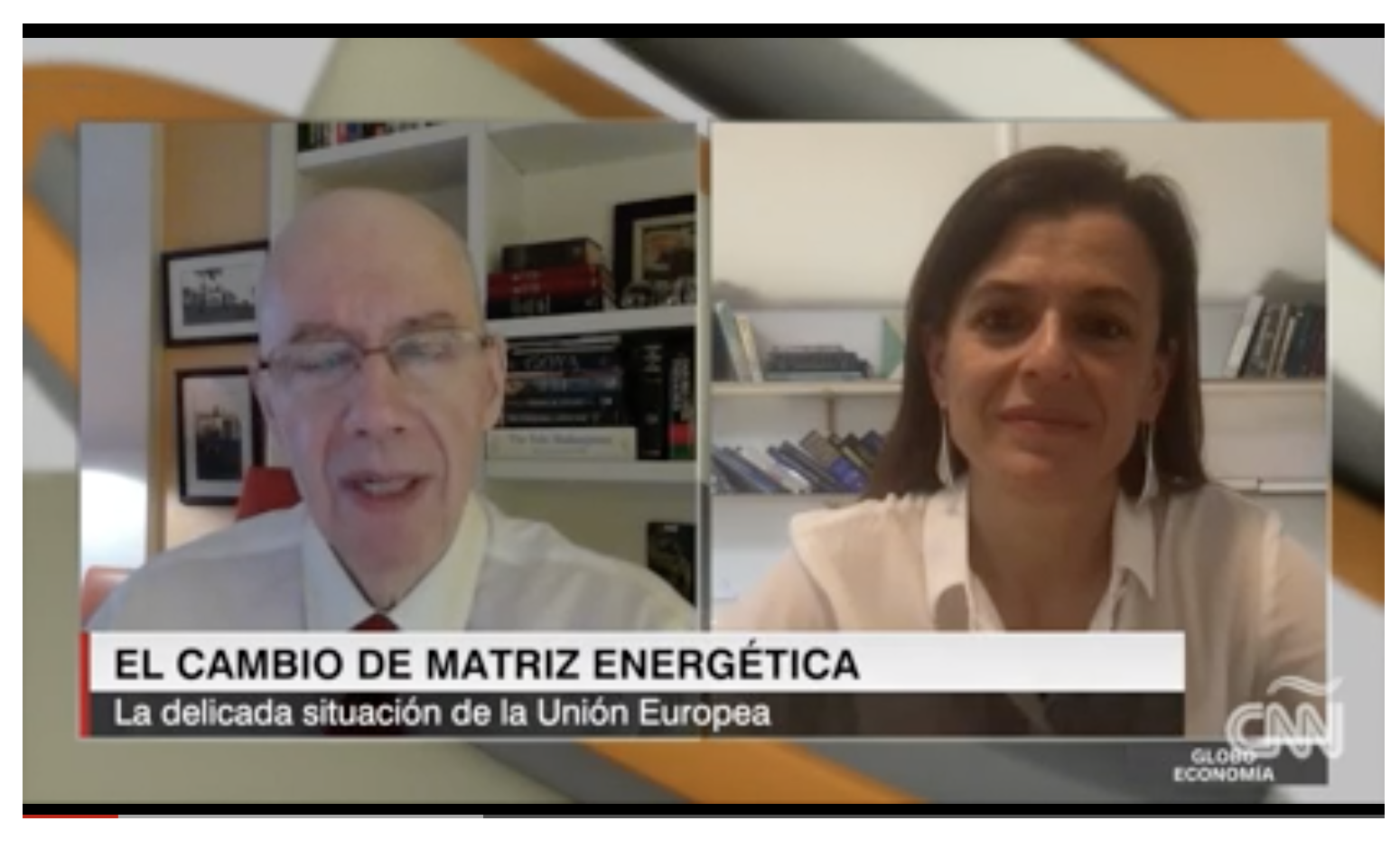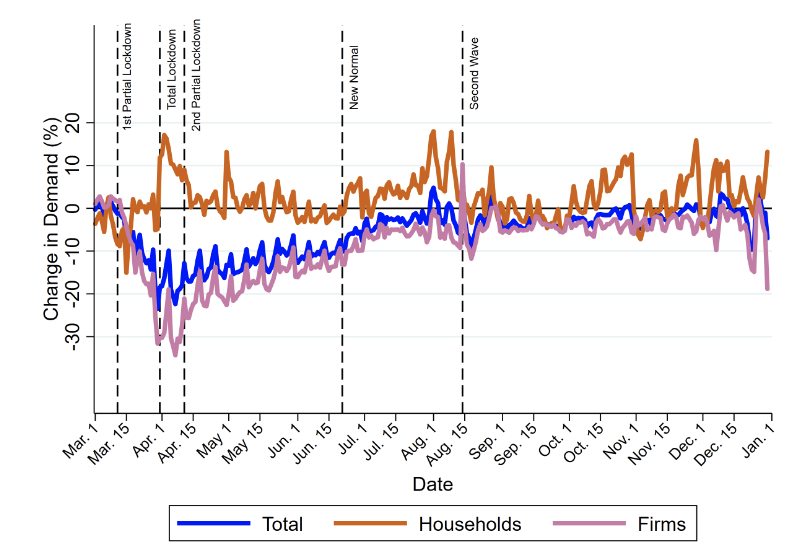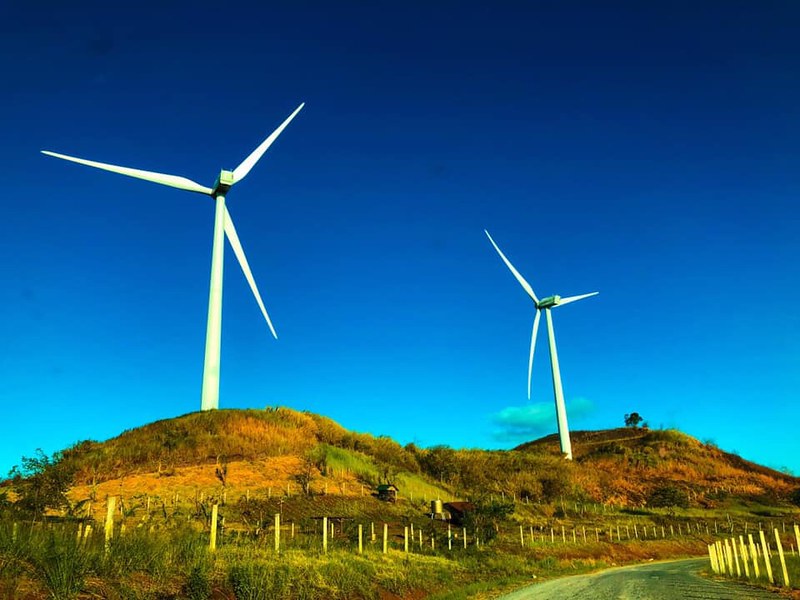“Hablamos de Europa”: clima y energía, la dimensión energética y de sostenibilidad
Dentro del ciclo “Hablamos de Europa” organizado por EsadeGeo, Natalia Fabra ha participado en la sesión que ha abordado los principales desafíos de la transición energética sinónimo de tecnología e industria y de liderazgo tecno industrial. Este fenómeno supera el ámbito nacional y debe enmarcarse en el ámbito de la Unión de la Energía. Asimismo, debe estar en línea con la Estrategia de Transición Justa de España y la de la Comisión Europea para articular y financiar el Pacto Verde Europeo y garantizar la sostenibilidad global.
EsadeGeo (Center for Global Economy & Geopolitics) organiza estas sesiones, en colaboración con la Secretaría de Estado para la Unión Europea del Ministerio de Asuntos Exteriores, Unión Europea y Cooperación.
Puedes ver la sesión completa aquí.
Las mañanas de RNE: medidas energéticas de la CE
La Comisión Europea ha propuesto un paquete de medidas para acabar de forma temporal con los beneficios extraordinarios de las energéticas. En Las Mañanas de RNE, Natalia Fabra, catedrática de Economía de la Energía de la Universidad Carlos III, considera que el diagnóstico es correcto y va en la dirección correcta aunque llega tarde. Además, cree que “el recorte no va a ser suficiente para atajar el verdadero encarecimiento”.
El paquete presentado este miércoles plantea fijar un límite de 180 euros por megavatio hora, sobre ello Fabra explica que “el precio de la electricidad rondado los 45 – 50 € el megavatio hora, un precio que no le suponía ningún quebranto económico a las empresas eléctricas” y recalca que “ahora estamos permitiendo que estén recibiendo un precio que multiplica por cuatro.”
La catedrática asegura que en estos momentos “las medidas puestas en marcha en España son más efectivas, tienen más calado que las que tendríamos si hiciéramos una traslación directa a las medidas que ha permitido Bruselas,” recalca.
Puedes escuchar la entrevista aquí.
Entrevista en CNN-Globoeconomía
José Antonio Montenegro en GloboEconomía entrevista a Natalia Fabra, directora del EnergyEcoLab de la Universidad Carlos III de Madrid.
Natalia explica la urgencia que tiene el mundo de una matriz energética basada en energías renovables. ¿Cómo afecta a este sector la invasión rusa de Ucrania?
Ver entrevista aquí.
3rd Summer School on “The foundations of climate and energy policies”
The European University Institute, Universidad Carlos III, DIW Berlin, Technical University Berlin, Universidad Autónoma de Madrid, University College London and Université Libre de Bruxelles are organising the third edition of the PhD Summer School on “Economic Foundations for Energy and Climate Policies”.
The Summer School will be held on September 19-23, 2022 at the European University Institute, on the Tuscan hills surrounding Florence. The programme of the School will consist of four days (Monday afternoon to Friday morning) of teaching by prominent academics, supplemented by students’ presentations and a roundtable with policymakers.
More information can be found here.
OECD workshop: “Environmental Policies: Social and Economic Outcomes”
Policy makers face the challenge of supporting both inclusive economic development and a healthy environment. To respond to this challenge, regulators need tools and insights to assess the consequences of policies on the environment, the economy and social outcomes. From a policy perspective, a desirable outcome is one that achieves the greatest environmental benefits while limiting the adverse economic and distributional impacts. This is all the more important as countries take different paths in addressing environment and climate challenges.
Empirical evidence shows that more stringent environmental policy has achieved significant environmental benefits with little aggregate effect on economic performance. However, localised effects may generate significant losses for certain sectors, firms or individuals while providing benefits to others. Policies must therefore be designed to mitigate the negative impacts while harnessing the benefits.
Research has further shown that by inducing innovation in clean technologies, environmental policies can actually increase the productivity of firms directly affected. Assessments of the impact on the broader supply chain, however, are less conclusive. This highlights the important role of empirical research in informing national policy processes and in shedding light on elements of policy processes that remain less well understood.
The employment impacts of environmental policies can be decisive in determining their political acceptability. While the objective of policies generally will be to limit the long-term employment effects, the adjustments costs might be significant and geographically concentrated. Empirical evidence on employment impacts at different levels – national, regional, sectoral or firm – can support policy design that takes into account this heterogeneity in impacts.
Environmental policies can also have substantial distributional effects when polluters do not bear the full cost of mitigating pollution. The benefits of environmental policies may also be unequally distributed e.g. when subsidies to clean technologies disproportionally benefit wealthier households. Empirical research provides important insights into policy mixes that minimise unfair distributional effects while achieving environmental objectives at the lowest economic cost.
With these issues in the background, the OECD has organized a workshop, “Environmental Policies: Social and Economic Outcomes”. This workshop aims to facilitate a discussion among policymakers, regulators, experts in empirical analysis, modelling and statistical analysis on the latest research on the impact
of environmental policies on social and economic outcomes. The discussion is guided by the following questions:
• What is the impact of environmental policies
on innovation in clean technologies, and in turn, economic performance of firms and sectors directly and indirectly impacted by those policies?
• What is the impact of environmental policy stringency on employment?
• What are the distributional effects of environmental policies and how can policy packages minimise the trade-off between efficiency, equity and cost-effectiveness?
Natalia Fabra has contributed to the panel analysing the impact of environmental policy on employment with her paper “Do Renewables create local jobs?” (EEL working paper)
EnergyEcoLab’s Publications on Energy Issues in the Context of the Pandemic
We are delighted to share three forthcoming publications that deal with energy issues in the context of the pandemic. This research deepens our understanding of the mechanisms through which lockdowns and movement restrictions affect energy consumption and associated carbon emissions. It further investigates the links between energy demand and economic activity (as measured by GDP, for example). And it discusses the lessons that electricity markets can provide to cope with security of supply issues such as the ones that arise during major shocks such as the pandemic. Our papers have been accepted at the European Economic Review, The Energy Journal, and Energy Policy.
Natalia Fabra, Aitor Lacuesta and Mateus Souza investigate “The implicit cost of carbon abatement during the COVID-19 pandemic” in an article published this month at the European Economic Review. The first step of the analysis was to predict what the (counterfactual) electricity demand in Spain would have been in case the COVID-19 pandemic had not happened. We employ highly flexible machine learning algorithms for this task, in order to obtain accurate hourly-level predictions. These predictions then serve as inputs for a power sector model which allows us to understand which power plants would have been dispatched in the counterfactual scenario. By comparing plants dispatched under realized and counterfactual electricity demand, we calculate that the carbon abatement attributable to the pandemic ranged between 3.9 and 4.1 Million Tons of CO2.
For carbon reductions in other sectors of the economy, we use data from the Carbon Monitor. Summing all sectors, we estimate that total carbon abatement in Spain reached 23 Million Tons of CO2 during 2020. However, this came at a great cost, even if we do not consider the health damages and human loss due to the pandemic. Using projections from the Bank of Spain, we find that the Spanish GDP loss in 2020 was 169.37 Billion Euros. Comparing this figure to the emissions avoided results in an implicit cost of carbon of 7319 Euro/Ton. We conclude the paper with simulations showing that the abatement observed in the power sector could have been achieved at a much lower cost by investing in renewables. For that case, the implicit cost would range between 60-65 Euro/Ton of CO2.
Paper available here.
We provide more insight about the mechanisms through which Spanish electricity demand reduced during the pandemic in a paper forthcoming at The Energy Journal: “Firms and Households during the Pandemic: What do we learn from their electricity consumption?” This was a joint study by Natalia Fabra and a team of researchers from the Bank of Spain: Olympia Bover, Sandra García-Uribe, Aitor Lacuesta, and Roberto Ramos. The paper starts by laying out how Spanish grid-level electricity demand data can be decomposed into firms’ demand versus households’ demand. The first insight from this exercise is that households’ consumption increased due to lockdowns and movement restrictions, while firms’ consumption substantially decreased. Since firms represent a larger portion of the market, the net effect was of a strong decrease in demand. By plotting the demand figures against GDP growth rates, the authors arrive at another key insight: economic activity is better captured by firms’ electricity consumption, such that using total electricity consumption would under-estimate the severity of the economic impacts of the pandemic. Finally, the study provides evidence of substantial changes in the hourly patterns of electricity consumption, which differ across firms and households. For example, the pandemic was associated with large declines in electricity consumption by firms during working times, which are paralleled by simultaneous increases in households’ electricity consumption.
Paper available here.
In “Learning from Electricity Markets: How to Design a Resilience Strategy“, forthcoming at Energy Policy, Natalia Fabra, Massimo Motta and Martin Peitz argue that the economics of electricity capacity mechanisms provides valuable lessons for the provision of essential goods during crises, which need to be complemented with other elements aimed at mitigating their causes and impacts. The pandemic and post-pandemic times have demonstrated that preparing for global shocks requires the quick availability of some essential goods and services, including energy. Private incentives are typically insufficient for an economy to be prepared for rare events with large negative impacts. Instead, they argue that governments and preferably supranational institutions should implement mechanisms that make sure that prevention, detection and mitigation measures are taken.
Paper available here.
EnergyEcoLab’s Publications on Renewable Energies
We are excited to announce three new accepted papers from our team’s work on renewable energies. These are forthcoming at The Economic Journal, the American Economic Journal: Economic Policy, and the Journal of the Association of Environmental and Resource Economists. These papers deal with a variety of issues regarding the expansion of renewable energies and accompanying support policies. First, the functioning of future wholesale electricity markets in cases where they are dominated by renewable energies. Second, the quantification of the effects of renewable energy subsidies regarding pricing incentives and market power. Third, the effect of uniform subsidies on the allocation of solar photovoltaic plants. These policies are widely used to support the deployment of renewable energies and thus our research directly contributes to the debate on optimal policy design.
In “Auctions with Privately Known Capacities”, forthcoming at The Economic Journal, Natalia Fabra and Gerard Llobet assess in a theoretical model bidding equilibria and market outcomes in renewables-dominated electricity markets. A key feature of the model is that the availability of renewable energy capacity is random and it is private information. The results show that private information on capacities changes the nature of the equilibrium as compared to the case when private information is on costs (or valuations), a typical assumption in the standard electricity market models. Additionally, the authors show that the uniform-price and discriminatory auctions are not revenue equivalent, in contrast to when costs are independently drawn.
Paper available here.
In “Market Power and Price Exposure: Learning from Changes in Renewables Regulation”, forthcoming at the American Economic Journal: Economic Policy, Natalia Fabra and Imelda, study how RE technologies affect firms’ pricing incentives in wholesale electricity markets. In particular, the authors analyze whether renewable energies depress electricity market prices, and how this effect depends on their degree of exposure to fluctuations in market prices. The paper develops a theoretical model to show that fixed market prices, such as feed-in tariffs, are relatively more effective at curbing market power of dominant firms that own large shares of renewable capacity. The authors test for the main theoretical predictions empirically using detailed data from the Spanish electricity market and confirm that a switch from full price exposure to fixed prices caused a 2-4% reduction in the average price-cost markup.
Paper available here.
In “(Mis)allocation of Renewable Energy Sources”, forthcoming at the Journal of the Association of Environmental and Resource Economists, Stefan Lamp and Mario Samano study feed-in tariffs as a form of uniform policy instrument in case of solar photovoltaic installations in Germany. The authors estimate the dispersion of marginal benefits from solar production and compute the social and private benefits from optimal reallocations of solar installations keeping total capacity fixed. They find that a reallocation of solar, in line with the marginal benefits, would lead to substantial gains compared to the status quo, especially if transmission capacity between regions was considered. Overall, the paper puts in perspective the social costs of nationwide policies that do not offer heterogeneous incentives.
Paper available here.
Día Mundial del Medio Ambiente
Con motivo de la celebración del Día Mundial del Medio Ambiente el 5 de junio, fecha en la que Naciones Unidas invita a fomentar la conciencia y la acción global en favor de la protección del entorno natural, la ONCE celebró el encuentro ‘Hacia una huella social sin impacto ambiental’. En el acto participaron Natalia Fabra, catedrática del Departamento de Economía de la Universidad Carlos III de Madrid; Fernando Valladares, doctor en Ciencias Biológicas por la Universidad Complutense de Madrid, profesor de investigación y ecólogo del CSIC; Pedro Pablo García May, adjunto a la dirección de ‘EFE Verde’, y Juergen Foecking, director adjunto de la Oficina del Parlamento Europeo en España. Todos participarán en un coloquio moderado por Carmen Cárceles, técnico de medio ambiente de la ONCE.
El video del encuentro puede verse aquí.
The redistributive effects of real-time electricity pricing
Toulouse professors, Stefan Ambec and Claude Crampes, have written a tribune in which they discuss the redistributive effects of real-time electricity pricing, for which they comment on the EnergyEcoLab 17200 working paper “The Distributional Impacts of Real Time Pricing”, by Natalia Fabra and co-authors.










